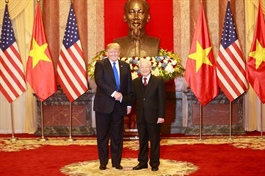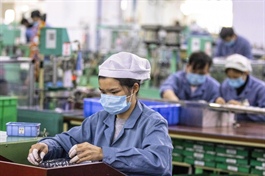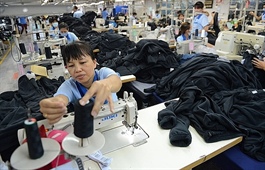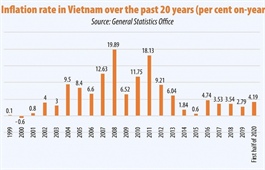Ministry of Planning and Investment introduces three new laws
Ministry of Planning and Investment introduces three new laws
The revised Law on Investment, Law on Enterprises, and Law on Public-Private Partnership (PPP) investment will contribute to completing the legal framework and creating transparency and a harmonious legal framework for trading and business in Vietnam.
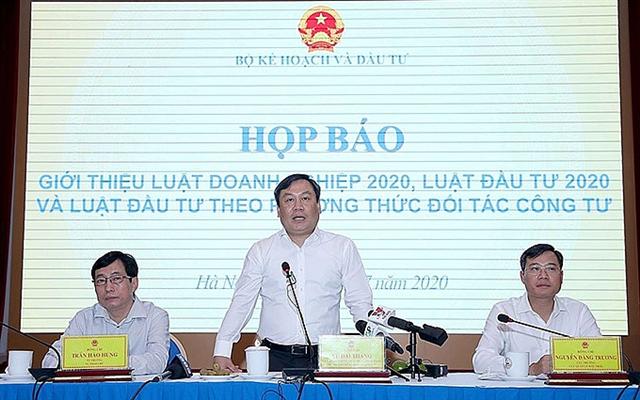
The three new laws will provide a more harmonious legal framework for investment and business
|
This was announced by Deputy Minister Vu Dai Thang at the press conference organised by the Ministry of Planning and Investment on July 10 to introduce the Law on Investment 2020, Law on Enterprises 2020, and Law on PPP.
“At the time of issuance in 2014, these laws created motivation for the economy’s growth and provided the necessary conditions for enterprises. However, after that, the state saw the rise of arising new trading models – for example, sharing economy models like those of Grab and Uber. In addition, after these laws were implemented, the state and government also issued numerous policies and resolutions which serve as the main reason for amending and adjusting the laws on investment and enterprises as well as the building of the Law on PPP investment," DPM Thang said.
“The Law on Investment 2020 has added sectors eligible for incentives to ensure that foreign investment attraction will match the Politburo’s orientations to perfect institutions and policies and to improve the quality and effectiveness of foreign investment co-operation until 2030. In addition, these incentives must also ensure synchronicity with incentives outlined in the Law on Tax and other laws,” he added.
Accordingly, numerous new sectors will be able to enjoy incentives, such as innovation, goods manufacturing, and value chain services.
The revised law clarifies the principles and conditions of applying incentives, with the incentives dependent on the efficiency of project implementation.
The prime minister will be allowed to provide special incentives to lure foreign investment inflows coming from the relocation of production facilities to the ASEAN, including Vietnam. However, the added incentives are not permitted to exceed the highest incentives laid out in the existing regulation by more than 50 per cent.
In order to ensure synchronicity as well as deal with the overlap between the Law on Investment and other laws, the revised law adjusted 10 groups of regulations while lawmakers revised five other laws.
Especially, the revised law clarifies the principles and conditions to providing incentives to investors which have projects using land, including regulations on auctioning land-use rights, bidding to select investors, as well as regulations on investment planning.
One of the highlights of the Law on Investment 2020 is the reformation of investment procedures. Notably, numerous unnecessary administrative procedures were removed, including the regulation that the prime minister is allowedto approve the investment planning of a project capitalised above VND5 trillion ($217.4 million).
People’s Committees in cities and provinces will be allowed to approve the investment planning of several types of projects, including golf courses.
The law has also simplified procedures to expand the freedom of investors during investment, including M&A deals.
Authorities will have to increase supervision and inspections to ensure national security in case foreign investors establish a business in Vietnam or conduct M&A deals with enterprises located in border areas, coastal communes, wards, towns, or sensitive areas from a national defence and security perspective.
The regulation also added appraising investment capital as the basis of calculating tax to prevent transfer pricing and tax evasion at suspect projects.
Regarding the revised list of conditional investment and trading sectors in the Law on Enterprises 2020, 22 sectors were struck from the initial list to ensure freedom for traders and enterprises.
This law simplifies the business registration process, redefines the term "state-owned enterprise" (SOE), and excludes household business from the scope of the current law as well as offers protection to minority shareholders.
“The Law on Enterprises 2020 will contribute to improving Vietnam's trading environment in order to achieve the government’s target of ranking in the ASEAN 4,” said Phan Duc Hieu, deputy director of the Central Institute for Economic Management, who participated in building the Law on Enterprises 2020.
Comprising of 11 chapters and 101 articles, the law regulates investment activities and private investment attraction under the PPP model to certain important and essential infrastructure sectors.
While PPP not a new form of investment in Vietnam, with especially build-operate-transfer (BOT) projects abundant in transport infrastructure development. This is the first time a specific bill on PPP has been submitted to the NA. The law focuses on five essential areas: transport; power grid and plants; irrigation, clean water supply, water drainage, and wastewater and waste treatment; healthcare and education – training; and information technology infrastructure.
The law maintained the government’s proposal on the threshold to trigger the risk-sharing mechanism when the actual revenue is 25 per cent less than the financial plan. On the contrary, when the actual revenue is above 125 per cent of the plan, the government would request investors to share the increased revenue.
The introduction of this law would address the issue of lacking a unified legal framework governing PPP in Vietnam similar to that seen in some of its regional peers (including the Philippines, Thailand).





